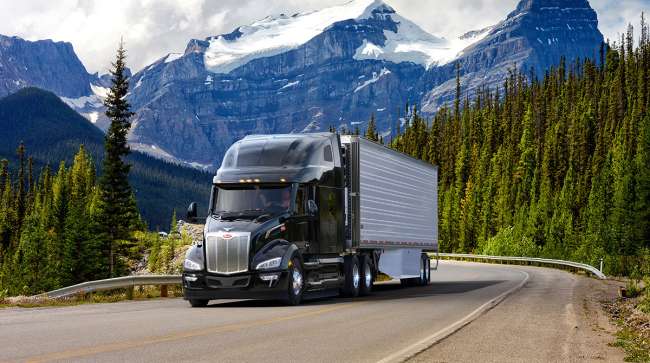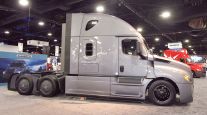Senior Reporter
October Class 8 Sales Show Broad Gains Over Year Earlier

[Stay on top of transportation news: Get TTNews in your inbox.]
U.S Class 8 retail sales in October improved 34.5% compared with a year earlier, Wards Intelligence reported as all but one truck maker notched higher sales. Sales were 22,863 compared with 17,002 a year earlier.
October’s total snuggled in among basically the same volumes posted over the past seven months.
“Stasis is the word that comes to mind,” ACT Research Vice President Steve Tam told Transport Topics. He said there was a little uptick in the build rates truck makers reported but nothing to lead him to think breakout numbers for retail sales are coming anytime soon.
The equilibrium is a result of the limitations the manufacturers have — and have had for a long time now — on the assembly side, Tam said.

Tam
ACT forecast U.S. Class 8 sales in 2022 would hit 259,000 units. That compared with 221,889 a year earlier, according to Wards Intelligence.
Among the truck makers with higher sales, all but one climbed by double digits.
Peterbilt Motors Co. saw sales rise the most by 49.1% to 3,384, good for a 14.8% market share. Kenworth Truck Co. increased sales by 47.3% to 3,028 and earned a 13.2% share. Peterbilt and Kenworth are brands of Paccar Inc.
“We just keep building all the trucks we can. We expect deliveries increasing in the fourth quarter, and beyond that, we’ll watch how the opportunities are,” Paccar CEO Preston Feight said during the company’s third-quarter earnings call. “As we think that the demand is strong, we do think that next year still feels like at least the beginning to be supply constrained.”
Preliminary NA Class 8 net orders in October were 42,500 units, while NA Classes 5-7 net orders were 23,400 units. Complete industry data for October, including final order numbers, will be published by ACT Research in mid-November.https://t.co/D6rFKARN8g pic.twitter.com/LPlkn8dhQf
— ACT Research (@actresearch) November 9, 2022
He noted the backlog at Kenworth and Peterbilt extends into the second quarter of 2023. “Overall, the strong truck market is expected to continue as a result of the solid freight volumes, high customer truck utilization and the increased fleet age,” Feight said.
Consistent market leader Freightliner improved sales by 38.9% to 9,056 and pulled down a 39.6% share. Freightliner is a brand of Daimler Truck North America.
Volvo Trucks North America saw sales rise 33% to 2,606 and earned an 11.4% share.

Koeck
“The total market seems to be quite consistent between 25,000 to 26,000 per month for U.S. and Canada,” said Magnus Koeck, vice president of strategy, marketing and brand management at VTNA. “We are now into the final stretch of this year, and the truck makers’ retail shares will be determined by who will manage the supply chain and their manufacturing output in the best way, and we at Volvo Trucks are confident we will end the year in a strong way.”
International posted a 29.1% increase in sales to 3,042 and notched a 13.3% share. International is a brand of Navistar Inc., a unit of Traton Group.
Mack Trucks improved sales by 3.9% to 1,328 and earned a 5.8% share. Mack and VTNA are units of Volvo Group.

Host Seth Clevenger delves into the TT Top 50 Global Freight Companies list, and how they are preparing for an uncertain future. Tune in above or by going to RoadSigns.ttnews.com.
Western Star, a unit of DTNA, posted the only decline as sales fell 25.7% to 419 for a 1.8% share.
Year-to-date sales climbed 11.8% to 202,088 compared with 180,685 in the 2021 period.
The 10-month market shares for most truck makers fell slightly. Freightliner’s was flat. Peterbilt improved to 15.1% compared with 14.7% a year earlier. VTNA rose to 11% compared with 9.1% a year earlier.
October’s sales could have come from as long as a year ago, Tam noted.
In October 2021, the backlog-to-build ratio was almost 15 months. It’s now eight months, he said.
“So we have made considerable progress in whittling that queue down, but we typically expect to see two to three months of backlog,” Tam said. “That is kind of the historical average. So we are well above from where the industry likes to be.”

Vieth
ACT President Kenny Vieth noted in October that forecasting sales in 2023 hinges on the timing of when lower freight volumes begin to compress carrier profitability. He said ACT’s current thinking is that begins in the second half of 2023.
“However, with pre-buying ahead of the California Air Resources Board’s expensive Clean Truck mandate late next year and still healthy carrier margins early in the year, a case can be made that demand strength will be sustained through 2023,” Vieth said. “Higher volumes in 2023 would come at the expense of vehicle demand in 2024.”
The CARB mandate requires manufacturers to sell an increasing percentage of zero-emission heavy-duty trucks into the market starting in model year 2024.
CARB noted other states could adopt the ACT regulation but would not need to adopt its Advanced Clean Fleet proposed 2040 100% zero-emission vehicle sales mandate — the end date for combustion-powered new vehicle sales in California.
Want more news? Listen to today's daily briefing below or go here for more info:




